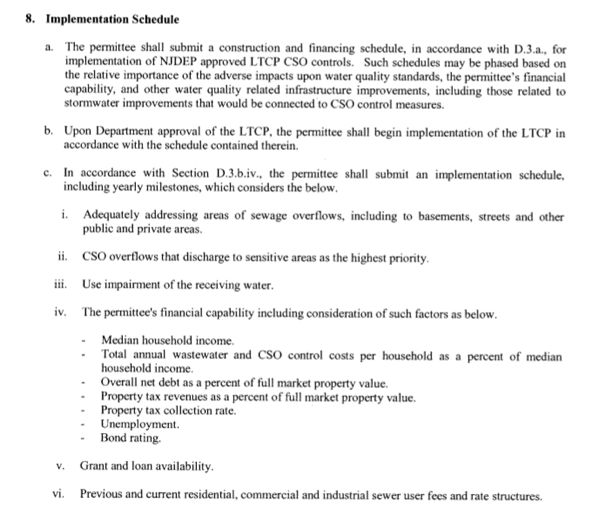New DEP CSO Permits Lack Teeth
Permits Only Require A “Long Term Control Plan” – But No Tasks and No Deadlines
No money and no mandates means that this round of DEP CSO permits is more of the same status quo study and delay
The DEP’s new “Combined Sewer Overflow” (CSO) permits are getting lots of media play today, and lots of very basic misconceptions, like this in the Bergen Record story:
“It’s great news – exactly what we’ve been asking for,” said Bill Sheehan, the Hackensack Riverkeeper. “It sets New Jersey on course to do real work to fix this problem once and for all. The cities and towns will now actually have to do stuff. And if they don’t, the permits are enforceable.“
Yes, the DEP permits do require that cities “do stuff” – lots of “stuff”.
“Stuff” like numerous studies and plans, the “stuff” they’ve been doing for decades that gets the big engineering and water resource consulting firms huge contracts but does nothing to improve water quality or stop the discharge or raw sewage from CSO’s when it rains.
But no, Captain Bill, the permits are not “enforceable” and they are intentionally written to be not enforceable.
So, just to be clear, below are the actual provisions of the DEP permit regarding implementation of CSO controls, i.e. actually constructing solutions to the problem within a specified and enforceable deadline.
I’ve taken the draft Paterson CSO permit as an example – the language is boilerplate and in all the CSO permits. You can look and see for yourself, under “G. Long Term Control Plan Requirements” (LTCP) item “8. Implementation schedule”, found on page 21.
You will note several glaring gaps and loopholes that make these permits unenforceable:
1. There are no mandatory deadlines to implement CSO controls. The only actual deadlines pertain to submission of plans and Reports.
2. The construction and financing schedule that must be submitted may be “phased” (an undefined and unbounded term that makes implementation unenforceable) and may consider the “permittee’s financial capability” (that too is an undefined term which will allow poor cities to escape costly CSO controls).
The Department even specifies the factors to be considered in evaluating “financial capability” , but the permit itself and the DEP regulations upon which the permit is based do not provide definitions and enforceable standards to determine what “financial capability” is.
For example, DEP estimates that Paterson CSO controls would cost over $1 billion. According to the 2010 census, Paterson has about 146,000 people and 49,000 households, with a median household income of just $39,000.
That’s a cost of $20,400 per household, about 50% of median household income.
[*Yes, I understand its apples/oranges and not valid to compare a capital cost with an income.]
I guarantee that Paterson will argue that they lack the “financial capability” to implement costly CSO controls and I can’t see any DEP Commissioner ever requiring that they do so.
3. Note that implementation of the LTCP is to begin after DEP approval, “in accordance with the schedule contained therein”.
The important point to take away is that the DEP regulations and the DEP permits do not have schedules. Schedules are to be developed at some future time in the LTCP process. No mandatory schedule means no teeth.
No money and no mandates means that this round of DEP CSO permits is more of the same status quo study and delay.
And if that’s “just what Captain Bill asked for”, then he’s either a liar or a bigger fool than I thought.
[PS – and if this is too complicated, just think about asking a bank for a mortgage with a “schedule” to develop a “long term payment plan” that is “phased” and based on your “financial capability” – would any bank in the world give you a mortgage like that?
